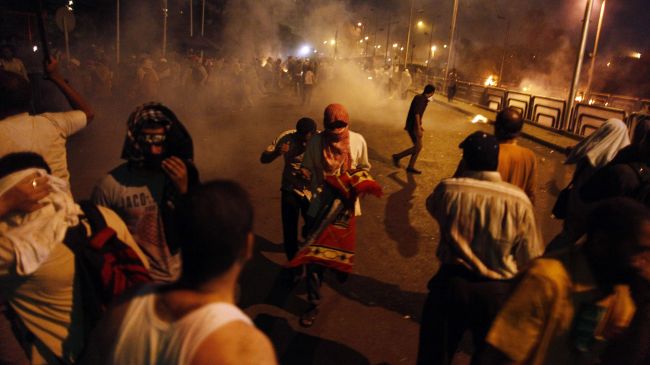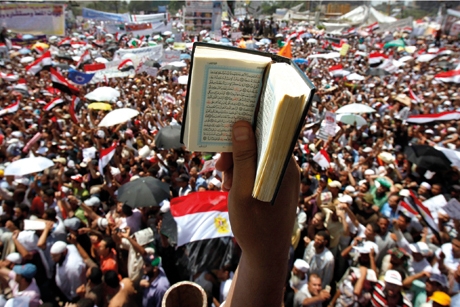No one can deny the sudden and unforeseen nature of the Tunisian uprising. Mohamed Bouazizi’s self-immolation touched off a movement that quickly evolved from a popular uprising into a broad-based revolutionary upheaval. Years of suffocation and frustration gave the movement the energy and the strength to overthrow the dictator Ben Ali who, to everyone’s surprise, fled his country very quickly indeed. Too quickly.
More and more sources are today pointing to the central and critical role played by the United States in managing the crisis from behind the scenes. Washington’s involvement in Tunisia (like that of Israel, on an ongoing mutual basis) has long been a matter of record in such sensitive areas as security, information and geostrategy. Dictator Ben Ali was himself a product of the United States military and security apparatus. While France ensured cordial relations with Europe, the Tunisian dictatorial system depended on American support and close collaboration with Israel. All of this was well known; the West’s guilty silence on the corrupt Ben Ali torture regime amounted to little more than safeguarding their multiple interests in the region. It mattered little that he killed, tortured or ruined his people as long as their regional security interests were protected. Nothing new, in other words.
The immediate American reaction to a rebellion that was as massive as it was unforeseen was startling; it was also well thought-out and cleverly handled. President Barack Obama early on hailed the courage of the Tunisian people while the European countries, led by France, kept silent, as if confounded by the rapid pace of events. Clearly Washington was well ahead of the other “Tunisia-friendly” governments. In fact, the American National Security Agency and the Joint Chiefs of Staff were able to manage the quickly evolving situation through the Tunisian Foreign Minister and the Commander in Chief of the country’s armed forces. After several hours of turmoil and uncertainty, rapid action had become imperative. Two key decisions were made: to exile the dictator and to assign to the army the role of mediation and protection. President Ben Ali stepped into a trap: the Foreign Minister persuaded him to leave the country “for a short time” the better to return once the situation was under control. Ben Ali left Tunisia believing that France was his destination (which explains the early rumors about his destination). But his aircraft flew to Cyprus where the Americans negotiated the dictator’s terms of exile: he would be kept in isolation, movement and public declarations prohibited, totally neutralized.
The American government stole a march on France and Europe. In so doing, it ensured that it would reap the underlying political and geostrategic benefits whose impact will be crucial in future. The rapidity of Ben Ali’s carefully stage-managed exile made it possible to circumscribe the potential impact of the Tunisian uprising on its Arab neighbors. Over and above the unexpected nature of the movement, and despite inevitable unforeseen developments, the situation was kept—and is being kept—under relative control. The army, whose high command has been and continues to be an ally of the United States, has contrived to preserve a basically positive image while playing the key role of observer, mediator and guardian of the highest interests of the nation. This is a significant accomplishment, which could prove determinant depending on how the situation develops in coming days, particularly with regard to the ongoing opposition to the provisional government (where key ministries are occupied by former regime stalwarts) and the prospect of free elections six months hence. The success of the Obama administration’s return to the North African, and more generally African scene is by no means accidental; not is it have anything to do with humanitarian concerns.
From Ivory Coast to Sudan, via the Sahel and the southern Mediterranean, the African continent has emerged as a vital strategic zone in terms of economy, geostrategy and security. European, and particularly French influence is currently facing a growing crisis of legitimacy in Africa as a result of the American and Chinese presence. These two newcomers appear to be allowing African leaders to take their distances from their difficult, centuries-long relationship with Europe, its memory and its interests.
The stakes are too high to be overlooked. Exploration for raw materials remains a key economic issue; the recent discovery of oil in the Sahel (Niger and Mali) is unlikely to satisfy the appetites of the Great Powers. Behind the region’s governments, its “friendly regimes”, its “election irregularities” and its social and military tensions, the United States and Europe—and now China, the new kid on the block—are locked in a bitter struggle for decisive political and economic influence. The specter of terrorism has arrived in the Sahel, justifying the presence of friendly western forces in the name of international security. American and French military bases, along with European and Israeli agents and experts are focused on the struggle against terrorism in the region.
The strategy of surveillance and armed intervention is brutal, implacable: the policy is to “kill all terrorists” while taking no prisoners (why?). All those who participated in the kidnapping of two young French nationals in Niger were eliminated even after the French government had announced the arrest of two of the hostage-takers before issuing a retraction. Raids are taking place week after week; deaths (of terrorists, bandits and smugglers) are announced, with no measurable progress in view. It is as though a permanent state of emergency were in force in order to justify heightened security concerns, the foreign military presence and political interference. All this in a region that has become economically attractive due to its substantial petroleum reserves.
Clearly, extremist violence must be fought. But we must not be so naïve as to forget that such violence can function as pretext for protecting and promoting other interests. The dictator Ben Ali, it was claimed, held Islamism in check, which in turn justified Western support. Today the Sahel as well as the South Sudan have emerged as areas of critical economic and strategic importance. The threat of violent, extremist Islamism is being used to conceal suspicious intentions.
While the Tunisian people attempts to protect all that it has gained in its revolutionary upsurge, American, European, Chinese and Russian power are attempting to carve out a role for themselves in Africa. Nor can the influential role of Israel’s intelligence services throughout North Africa, including Sudan (as detailed in Pierre Péan’s journalistic investigation in Morocco, Algeria, Rwanda and Eritrea, and even in Ethiopia). What is at stake are economic, security and strategic military interests.
The Tunisian revolution is widely praised; the former dictator disgraced. But behind the scenes of the public and media theatre, political maneuvering and meddling are continuing apace. The American administration is following developments closely, and is close to events as they unfold in Tunisia. It will do whatever is necessary to protect its interests, and those of Israel and of its allies in Egypt, Jordan and throughout the Middle East. While the issues of Iran and Lebanon appear to have monopolized American and European media attention, we must not minimize the second U.S. front, that of African and regional policy at the risk of naively hailing a “Tunisian revolution” without taking strict account of what remains to be done to ensure its political independence and democratic transparency. And of smiling at the bright promised victory while other forces cynically count, in the shadows, the dividends of their newfound influence and windfall profits.
We need lucidity, that of active, positive realism, not the illusions of wistful dreamers and naïve sentimentalists.










VIDEO
-[Tariq Ramadan on Democracy in the Middle-East, European Islam, USA and the peace process in the Israeli- Palestinian conflict->http://www.dailymotion.com/video/xgs2zm_ramadan-tariq-perspectives-on-democracy-in-the-middle-east_webcam]
Great article, thank you. (I believe where you say Cyprus was Ben Ali’s stop over, you mean Malta.)